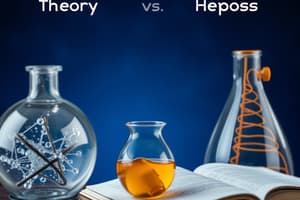Podcast
Questions and Answers
What are the components of the scientific method?
What are the components of the scientific method?
- Conclusion (correct)
- Predictions and Experiments (correct)
- Hypothesis (correct)
- Observation (correct)
What distinguishes a theory from a hypothesis?
What distinguishes a theory from a hypothesis?
A theory is a well-substantiated explanation, while a hypothesis is a tentative explanation.
What is the role of the experimental variable in an experiment?
What is the role of the experimental variable in an experiment?
It is the factor that is being tested.
What are the roles of the test group and control group in an experiment?
What are the roles of the test group and control group in an experiment?
How does a scientist test a hypothesis about an observation?
How does a scientist test a hypothesis about an observation?
What is the scientific method?
What is the scientific method?
What is observation in the context of the scientific method?
What is observation in the context of the scientific method?
What is inductive reasoning?
What is inductive reasoning?
What is a hypothesis?
What is a hypothesis?
What is an experiment?
What is an experiment?
What is deductive reasoning?
What is deductive reasoning?
What does prediction refer to in scientific research?
What does prediction refer to in scientific research?
What is experimental design?
What is experimental design?
What is an experimental variable?
What is an experimental variable?
What is a responding variable?
What is a responding variable?
What is a control in an experiment?
What is a control in an experiment?
What is a model in scientific research?
What is a model in scientific research?
What does data refer to in scientific research?
What does data refer to in scientific research?
What is a principle in science?
What is a principle in science?
What is a law in the context of natural science?
What is a law in the context of natural science?
What are theories in science?
What are theories in science?
Flashcards are hidden until you start studying
Study Notes
Scientific Method Components
- Observation, Hypothesis, Predictions, Experiments, Data collection with statistical analysis, and Conclusion are essential steps in the scientific method.
- The scientific method is a systematic process used for research and gaining knowledge.
Theory vs. Hypothesis
- Theory: A well-substantiated explanation of some aspect of the natural world, developed through repeated testing and validation.
- Hypothesis: A tentative and testable statement that offers a possible explanation for an observation.
Role of Experimental Variable
- The experimental variable is the factor being tested in an experiment, crucial for determining its effect on the outcome.
Test Group vs. Control Group
- Test Group: Receives the experimental variable to observe the effects.
- Control Group: Similar to the test group but does not receive the experimental variable, serving as a benchmark.
Testing a Hypothesis
- Scientists test hypotheses through well-designed experiments that include observation, variable manipulation, and data collection.
Definition of Key Terms
- Scientific Method: A standardized approach for conducting research systematically.
- Observation: The first step in the scientific method, focusing on data collection from experiments or natural events.
Reasoning Types
- Inductive Reasoning: Forms general principles from specific observations, crucial for building theories.
- Deductive Reasoning: Uses general principles to predict specific outcomes, often framed as "if...then" statements.
Expectation and Design
- Prediction: Anticipated outcomes based on the hypothesis.
- Experimental Design: Refers to how an experiment is structured to ensure valid results.
Additional Key Terms
- Responding Variable: The outcome that changes as a result of the experimental variable's manipulation.
- Control: A sample that follows the same experimental process without the variable being tested, used for comparison.
- Model: A simulation that helps in understanding complex processes before firsthand study.
- Data: Collected facts or information from observations or experiments.
- Principle: Generally accepted theories supported by a large number of scientists.
- Law: A universal principle that describes fundamental natural phenomena.
- Theories: Comprehensive explanations of aspects of the natural world, backed by evidence and acceptance within the scientific community.
Studying That Suits You
Use AI to generate personalized quizzes and flashcards to suit your learning preferences.




